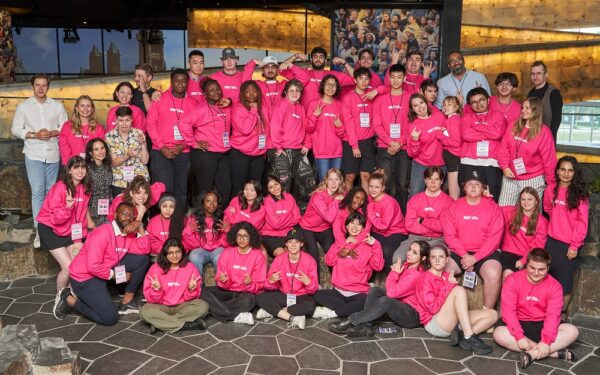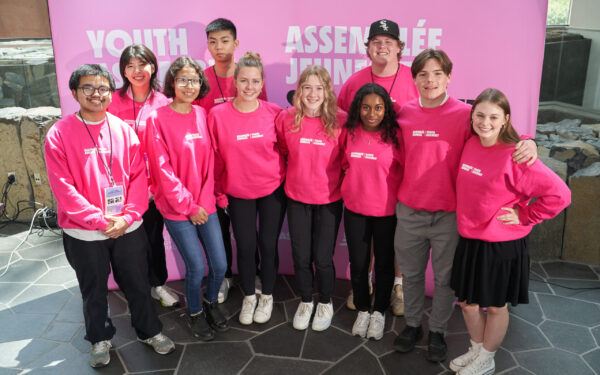To mark the inaugural National Truth and Reconciliation Day, we wanted to share some of the inspiring work being done by and with Indigenous communities to bridge Canada’s digital divide.
At a time when high quality internet access is essential, basic service remains out of reach in most Indigenous communities across the country. According to the Canadian Radio-television and Telecommunications Commission’s (CRTC) latest Communications Monitoring Report, only 34.8 per cent of First Nations reserves have access to the CRTC’s universal service objective speeds of 50 megabits per second (Mbps) download and 10 Mbps upload.
This lack of access to high-quality internet is a huge barrier, holding Indigenous people back from full participation in our increasingly digital world. And that’s not the only problem: funding for digital initiatives is generally scarce in Canada. Indigenous leaders like Denise Williams of the First Nations Technology Council have identified how the competitive nature of grant funding is at odds with the culture and traditions of Canada’s First Nations, Inuit and Métis peoples.
Despite these challenges, a number of Indigenous communities have launched remarkable initiatives to help resolve the digital inequities facing their communities—efforts that CIRA is proud to play a small role in through our Community Investment Program.
Communities solving access issues
While a simple router reboot can resolve most connectivity issues for urban dwellers, slow or non-existent internet is an everyday battle for people living in Indigenous communities across the country. This painful reality, made more urgent by the pandemic, is driving many Indigenous communities to take internet matters into their own hands.
One of these communities is Samson Cree Nation in Maskwacis, Alberta, located outside of Edmonton. Through grants from our Community Investment Program, CIRA is supporting the Mamawapowin Technology Society’s efforts to upgrade its broadband network and business plans. The group plans to expand high-speed access for everyone living and working on Samson and nearby Ermineskin Cree Nation, bringing the community’s dream of a sustainable locally-owned and operated internet service provider (ISP) within reach.
For Indigenous communities to be considered eligible for the government’s Universal Broadband Funding, they have to show that their connection fails to meet the CRTC’s universal service objective of 50/10 Mbps.
Hundreds of Indigenous communities are using CIRA’s Internet Performance Test to heatmap the quality of internet in their region to identify where upgrades are most urgently needed. This includes the 28 First Nations communities and over 25,000 people that make up Grand Council Treaty #3 in Northwestern Ontario and the unceded traditional territories in BC’s Columbia Basin.
Having a visual representation that paints a picture of just how slow the internet is across a region puts communities in the driver’s seat to engage citizens, plan improvements and make the case to government, ISPs and other funders for support.
Incubating business and career opportunities
In order to thrive online, you need more than a fast internet connection. Thankfully, a wellspring of programs have emerged to help equip Indigenous communities with the knowledge, skills and digital “street smarts” they need to meaningfully participate in our digital economy–and CIRA is proud to showcase a few that we have supported here.
Inspiring the imaginations of students living in remote communities through virtual field trips and contact with celebrities is only possible with carefully curated content and a reliable internet connection. Connected North brings real-time interactive sessions with Indigenous role models to students in remote Northern communities, sparking kids’ interest and curiosity in future career paths.
When Ottawa-based tech charity CompuCorps found that mothers, especially Indigenous women, were keen to establish an online presence, a grant from CIRA’s Community Investment Program helped them create specialized courses focused on how to set up an online business, with over 200 women receiving support and resources since the program began.
This year CIRA has also been a proud seed sponsor for Pow Wow Pitch, an opportunity for us to pitch in and help Indigenous entrepreneurs develop, enhance and accelerate growth for their businesses. CIRA is providing up to 1,000 .CA domains to Indigenous entrepreneurs and CIRA staff participated as mentors and guest judges.
We know that First Nations, Métis and Inuit communities from coast to coast to coast have the ideas and ingenuity that will take everything the internet has to offer and make the most of it. What is needed to make those ideas a reality is funding – funding to get basic access infrastructure in place as well as funding and support to get these projects off the ground.
CIRA will continue to offer support for projects benefitting Indigenous communities through our annual grants program and other community investment initiatives—and we invite Canada’s philanthropic community to join us.
Shehnila is a Communications Specialist at CIRA. Shehnila comes from an agency background where she’s had experience executing campaigns for some of Canada’s leading brands.
- [email protected]
- Phone
- 613-805-3146





